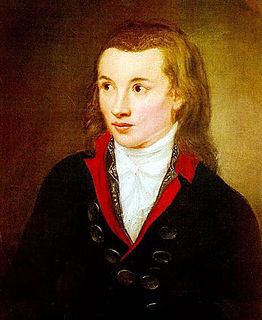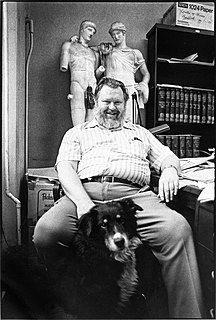Related Research Articles

As a literary device or artistic form, an allegory is a narrative or visual representation in which a character, place, or event can be interpreted to represent a hidden meaning with moral or political significance. Authors have used allegory throughout history in all forms of art to illustrate or convey complex ideas and concepts in ways that are comprehensible or striking to its viewers, readers, or listeners.

Geoffrey Chaucer was an English poet and author. Widely considered the greatest English poet of the Middle Ages, he is best known for The Canterbury Tales. He has been called the "father of English literature", or, alternatively, the "father of English poetry". He was the first writer to be buried in what has since come to be called Poets' Corner, in Westminster Abbey. Chaucer also gained fame as a philosopher and astronomer, composing the scientific A Treatise on the Astrolabe for his 10-year-old son Lewis. He maintained a career in the civil service as a bureaucrat, courtier, diplomat, and member of parliament.
Philology is the study of language in oral and written historical sources; it is the intersection of textual criticism, literary criticism, history, and linguistics. Philology is more commonly defined as the study of literary texts as well as oral and written records, the establishment of their authenticity and their original form, and the determination of their meaning. A person who pursues this kind of study is known as a philologist.

The Romaunt of the Rose is a partial translation into Middle English of the French allegorical poem, le Roman de la Rose. Originally believed to be the work of Chaucer, the Romaunt inspired controversy among 19th-century scholars when parts of the text were found to differ in style from Chaucer's other works. Also the text was found to contain three distinct fragments of translation. Together, the fragments—A, B, and C—provide a translation of approximately one-third of Le Roman.

Georg Philipp Friedrich Freiherr von Hardenberg, better known by his pen name Novalis, was an 18th-century German aristocrat, poet, author, mystic and philosopher of Early German Romanticism.

Medieval literature is a broad subject, encompassing essentially all written works available in Europe and beyond during the Middle Ages. The literature of this time was composed of religious writings as well as secular works. Just as in modern literature, it is a complex and rich field of study, from the utterly sacred to the exuberantly profane, touching all points in-between. Works of literature are often grouped by place of origin, language, and genre.

The University of Alabama is a public research university in Tuscaloosa, Alabama. Established in 1820 and opened to students in 1831, the University of Alabama is the oldest and largest of the public universities in Alabama as well as the flagship of the University of Alabama System. The university offers programs of study in 13 academic divisions leading to bachelor's, master's, education specialist, and doctoral degrees. The only publicly supported law school in the state is at UA. Other academic programs unavailable elsewhere in Alabama include doctoral programs in anthropology, communication and information sciences, metallurgical engineering, music, Romance languages, and social work.
Aurelius Prudentius Clemens was a Roman Christian poet, born in the Roman province of Tarraconensis in 348. He probably died in the Iberian Peninsula some time after 405, possibly around 413. The place of his birth is uncertain, but it may have been Caesaraugusta (Saragossa), Tarraco (Tarragona), or Calagurris (Calahorra).

Political interpretations of The Wonderful Wizard of Oz include treatments of the modern fairy tale as an allegory or metaphor for the political, economic, and social events of America in the 1890s. Scholars have examined four quite different versions of Oz: the novel of 1900, the Broadway play of 1901, the Hollywood film of 1939, and the numerous follow-up Oz novels written after 1900 by Baum and others.
Nicholas Bozon, or Nicole Bozon, was an Anglo-Norman writer and Franciscan friar who spent most of his life in the East Midlands and East Anglia. He was a prolific author in prose and verse, and composed a number of hagiographies of women saints, reworkings of fables, and allegories.

Exodus is the title given to an Old English alliterative poem in the Junius manuscript. Exodus is not a paraphrase of the biblical book, but rather a re-telling of the story of the Israelites' flight from Egyptian captivity and the Crossing of the Red Sea in the manner of a "heroic epic", much like Old English poems Andreas, Judith, or even Beowulf. It is one of the densest, most allusive and complex poems in Old English, and is the focus of much critical debate.
Durant Waite Robertson Jr. was a scholar of medieval English literature and especially Geoffrey Chaucer. He taught at Princeton University from 1946 until his retirement in 1980 as the Murray Professor of English, and was "widely regarded as this [the twentieth] century's most influential Chaucer scholar".
The "Battle of Brunanburh" is an Old English poem. It is preserved in the Anglo-Saxon Chronicle, a historical record of events in Anglo-Saxon England which was kept from the late ninth to the mid-twelfth century. The poem records the Battle of Brunanburh, a battle fought in 937 between an English army and a combined army of Scots, Vikings, and Britons. The battle resulted in an English victory, celebrated by the poem in style and language like that of traditional Old English battle poetry. The poem is notable because of those traditional elements and has been praised for its authentic tone, but it is also remarkable for its fiercely nationalistic tone, which documents the development of a unified England ruled by the House of Wessex.
Jeremy Tambling is a British writer and critic. He was Professor of Comparative Literature at the University of Hong Kong until 2006 and then Professor of Literature at the University of Manchester until December 2013. His most recent position is Professor of English at the University of Social Sciences and Humanities, Warsaw (2019).
Richard Firth Green is a Canadian scholar who specializes in Middle English literature. He is a Humanities Distinguished Professor of English Emeritus at Ohio State University and author of three monographs on the social life, law, and literature of the late Middle English period.
Laura Howes is an American scholar of Middle English literature. She is the author of Chaucer's Gardens and the Language of Convention (1998) and the editor, with Marie Borroff, of the Norton Critical Edition of Sir Gawain and the Green Knight (2010). Howes received her B.A. from Cornell University and her M.A. and Ph.D. from Columbia University, and is Professor of English at the University of Tennessee.
John D. Niles is an American scholar of medieval English literature best known for his work on Beowulf and the theory of oral literature.
Jane Chance, also known as Jane Chance Nitzsche, is an American scholar specializing in medieval English literature, gender studies, and J. R. R. Tolkien. She spent most of her career at Rice University, where since her retirement she has been the Andrew W. Mellon Distinguished Professor Emerita in English.
Racism in United States college fraternities and sororities has been linked to the experience of microaggressions, fewer opportunities to use the networking system built into Greek life, and harmful stereotypes. This fuels the experiences of people of color throughout their lives in various academic, work, and personal spaces, including Greek Life Organizations (GLOs). Many have argued that through the creation of these organizations, there has been a legacy of racism, which has fueled the elitist structure that has negatively impacted people of color the most[citation needed].

Robert Earl Kaske was an American professor of medieval literature. He spent most of his career at Cornell University in Ithaca, New York, where he was the Avalon Foundation Professor in the Humanities, and where he founded one of the preeminent medieval studies graduate programs in North America. His published output included lengthy interpretations of Beowulf and of poems and passages by Dante and Chaucer, and frequently constituted leading studies. Kaske particularly enjoyed solving cruxes, with articles on problematic passages in works such as Pearl, Piers Plowman, the Divine Comedy, The Husband's Message, The Descent into Hell, and Beowulf.
References
- ↑ "Catalog 10: College of Arts and Sciences". University of Alabama . Retrieved 16 September 2013.
- 1 2 "Professor finds link in athletics, academics". Tuscaloosa News . 29 October 1989. p. D4. Retrieved 12 September 2013.
- 1 2 "The University of Alabama: Where Racial Segregation Remains a Way of Life". The Journal of Blacks in Higher Education . 32 (32): 22–24. 2001. doi:10.2307/2678750. JSTOR 2678750.
- ↑ Fyler, John M. (1986). "Rev. of Hermann and Burke, Signs and Symbols in Chaucer's Poetry". The Yearbook of English Studies . 16: 230–31. doi:10.2307/3507782. JSTOR 3507782.
- ↑ Fowler, David C. (1984). "Additions to the Golden Mountain: Four Recent Books on Chaucer". Modern Philology . 81 (4): 407–14. doi:10.1086/391329. JSTOR 437055. S2CID 162541296.
- ↑ Bishop, Ian (1984). "Rev. of Hermann and Burke, Signs and Symbols in Chaucer's Poetry". The Review of English Studies . ns 35 (139): 357–59. doi:10.1093/res/XXXV.139.357. JSTOR 515777.
- ↑ Reeves, Steve (7 November 2001). "Officials say racial incident wouldn't happen at UA". Tuscaloosa News . Retrieved 16 September 2013.
- ↑ Torbenson, Craig L. (2009). "Praising God and Maintaining Tradition: Religious Diversity within College Fraternities and Sororities". In Craig LaRon Torbenson, Gregory Parks (ed.). Brothers and Sisters: Diversity in College Fraternities and Sororities. Associated University Presse. pp. 210–36. ISBN 9780838641941.
- 1 2 Gose, Ben (5 December 1997). "U. of Alabama Studies Why Its Fraternities and Sororities Remain Segregated by Race". The Chronicle of Higher Education . Retrieved 16 September 2013.
- 1 2 Zengerle, Jason (4 February 2002). "Sorority Row". The New Republic . Retrieved 16 September 2013.
- ↑ "Campus Life: Alabama; Integration Is at Hand For Fraternity System". The New York Times . 25 August 1991. Retrieved 16 September 2013.
- ↑ Gettleman, Jeffrey (10 September 2001). "Sorority System In No Rush to Integrate". Los Angeles Times . Retrieved 16 September 2013.
- 1 2 Hermann, Allegories 5.
- ↑ Godfrey, Mary Flavia (1993). "Beowulf and Judith: Thematizing Decapitation in Old English Poetry". Texas Studies in Literature and Language . 35 (1): 1–43. JSTOR 40754998.
- ↑ Heckman, Christina M. (2009). "Things in Doubt: Inventio, Dialectic, and Jewish Secrets in Cynewulf's Elene". Journal of English and Germanic Philology . 108 (4): 449–80. doi:10.1353/egp.0.0072. JSTOR 20722771. S2CID 170675629.
- 1 2 Irvine, Martin (1991). "Rev. of Hermann, Allegories of War". South Atlantic Review . 56 (2): 127–29. doi:10.2307/3199964. JSTOR 3199964.
- 1 2 Boren, James L. (1992). "Rev. of Hermann, Allegories of War and Parks, Verbal Dueling in Heroic Narrative". Journal of English and Germanic Philology . 91 (1): 120–23. JSTOR 27710622.
- ↑ Harris, Joseph (1992). "Rev. of Hermann, Allegories of War". Speculum . 67 (4): 983–86. doi:10.2307/2863508. JSTOR 2863508.